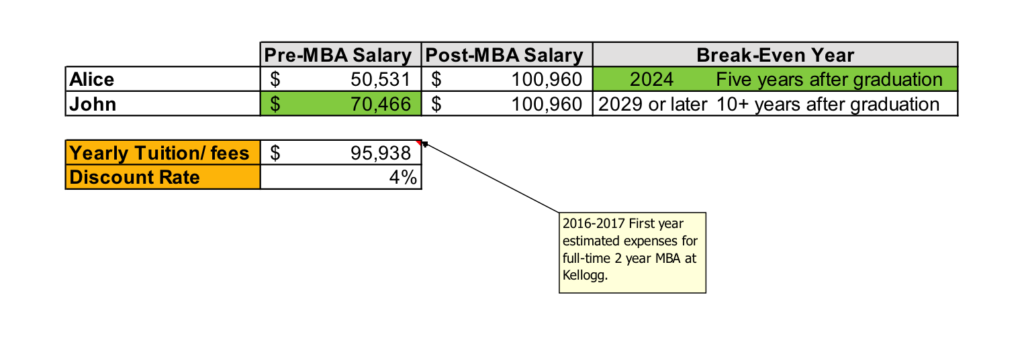Guest Blog: Is Getting An MBA Truly an Investment in Yourself?
“You should look at it as an investment in yourself.”
This is the common advice given to potential applicants when weighing the costs associated with business school. The quote evokes imagery of a person going to a race track counter, slamming a briefcase of money on the table, and opening it up in a dramatic fashion before saying “I’d like to wager $200,000 on ME.” It makes sense right? We constantly make bets on other people, whose actions we cannot influence, to improve our lives. Why not do the same with ourselves?
I’m not so sure it’s the correct mentality to have however.
A Counter Idea
Full transparency here… I graduated in June 2016 and my loans have entered repayment. Each month I have the very real moment of deducting large amounts from my bank account to pay lenders. This process will continue for the next 10 years. As a result, I think about this topic multiple times a day. I find myself asking, “Was this really the right investment in myself?” It’s almost akin to borrowing money from a loan shark to get a heart transplant. Surely it was for a good cause. No one can dispute that… But was this the best way to do it? I’m on the hook for these payments no matter what happens in the future.
I want to be clear, I am not saying that people should not take out loans to further their education. In many cases it makes perfect sense. What I’m suggesting is that potential applicants give as much time and thought to the situation as they can. There are multiple ways to approach this. Let’s start by performing some simple ROI calculations. (I have attached a tool* that may help you calculate your ROI.) This tool compares the cost of your MBA with the forgone wages from deciding not to continue working. I used this tool when I was applying and you may be useful for you. It incorporates a fair amount of assumptions but will at least get you in the ballpark.
Analysis
I want to be clear on my intentions. I want to help you explore your options. It is not my intention to delve deeply into financial theory. For the purposes of this article I will keep it simple and use the Single Stage Net Present Value (NPV), which assumes a constant salary growth in both the pre-MBA and post-MBA scenarios.
Let’s look at Scenario A:
Alice is making roughly $50,000 a year working as a Marketing Associate. She aspires to be an Assistant Brand Manager at a top CPG company post-MBA. Business school presents her with the opportunity to double her salary in a span of two years. (Average ABM salary + bonus = $101K) For a person in this situation, taking two years from work and having a significant financial gain is a seemingly easy choice. The tool supports this theory as it shows that she will breakeven in five years after graduation.
Now let’s look at Scenario B:
John is a Mechanical Engineer making $70,000. He also aspires to work in brand management post-MBA. Entering his numbers into the spreadsheet tells a different story. It will take him over 10 years to reach a breakeven point. This is not too surprising given that he is not aiming for a high income post-MBA job like consulting or banking. He ultimately ends up making a similar salary to the one he was making before attaining his MBA.

Comparison of Alice and John. See spreadsheet for more details.
Do Numbers Tell the Whole Story?
While it is nice to perform numerical analysis, perhaps we should consider some non-monetary factors. Happiness has to account for something right? I know many of my classmates were downright miserable in their jobs prior to business school. For these persons, it was not solely about the money. It was about the opportunity as well. A full-time MBA program provided the opportunity to change jobs, switch locations, take a break from work, and ultimately increase their happiness. The potential hope that the future provided outweighed any financial consideration that would be gained by staying at their job. I wish I could share a nifty spreadsheet to help you evaluate these things, but I can’t. This is the part you have to know for yourself. Take the time before business school to really envision the type of life you want for yourself. Start by asking yourself the following questions:
- What activities leave me the most fulfilled?
- Is there a way I can incorporate these things into my life on a regular basis?
- Is business school going to help me get there?

Still in doubt? Check out ‘After School: Is Getting an MBA Really Worth It?’ For further perspective in the MBA decision process.
Do I Have Second Thoughts?
As much as I hate making loan payments, I do not have any regrets. I’ll say that again… I DO NOT HAVE ANY REGRETS! I was able to get a well-respected, top notch education. Furthermore, business school expanded my network and introduced me to a way of thinking that I would have never been exposed to without it. During that period I met lifelong friends and was able to travel the world. I cannot put a dollar value on that experience, but it meant a lot to me.
So I leave you with my perspective as well as a call for action. Take the spreadsheet and look at your situation through a financial lens. But don’t stop there, talk to friends, reach out to alumni, and gather as much perspective as you can. Ultimately this is a major decision and you’ll have to live with it. What you cannot do is simply let your financial future be determined by an empowering quote. Too often the very people who are expected to be the financial leaders of the future, forego even the most rudimentary financial analysis before making one of the biggest financial decisions of their life. Can you put a price on changing your life? I’m not sure. What I can tell you is that asking myself “What if?” was a price that I was not willing to pay. Neither should you.
*Full credit for this spreadsheet goes to ryguy904 of GMATclub. The spreadsheet remains unedited, save for updates to the years used in the formulas, and additional tabs highlighting the scenarios in this article. It is being shared to help others. It is not the intent of the author to take credit for this work. The specific thread on the spreadsheet can be found here.
About the Author
Montoya Trice is a 2016 graduate of the MMM Program at the Kellogg School of Management. He is currently working in the Leadership Development Program at AT&T. He has done projects for John Deere, Maserati, Mattel, and Kellogg Marketing & Communications. He can be reached on Twitter and on LinkedIn.

Comments
Dice View
We getting nice information through this blog. It’s Greate and Very Helpful. Thanks again and keep up the great work!
http://diceview.com/
DiceView
Fantastic article, I have bookmarked this excellent website and may learn more later. keep up the great work!
http://diceview.com/